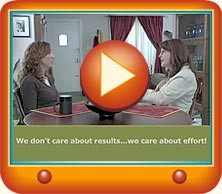This video—and the written conversation below, which is different than the conversation caught on video—continues Kelly and my discussion about why achievements themselves don’t matter and why we should care more about effort than results. (If you are reading this post in an email, click here to view the video.) Enjoy!
Christine Carter, Ph.D.: So my kids’ father overheard me tell Fiona that it didn’t matter if she wasn’t any good at softball, only that she practiced and made an effort. Later, he asked me, “Do we really want to invest the time and money schleping her to practice and games if softball isn’t her thing?”
Kelly Corrigan: That’s a notion that’s been around forever, that everyone has “a thing” and parents should help their children find it. I remember feeling panicky as a kid because my brothers each had a thing and I didn’t. Or rather, I had a thing, but it was vague and hard to label. Other people’s “things” were simple: tennis, chess, drama. My thing was making things – collages, stationary, hot pot holders. So I’m with Mike. Why force it with Fiona if softball isn’t her thing? Why not keep looking?
”
If you are reading this post in an email, click here here to view the video.
CC: Because that means it’s only worth doing if you are very good at it. That means it’s only fun when you succeed.
KC: Yeah but can we honestly say we don’t want our kids to do things they’re good at? And like I said last week, if it seems hard to get them to try new things now, when they’re so small, imagine how hard it will be when they are in high school, when their achievements might make or break college admissions.
CC: The mindset research we discussed last week doesn’t imply that growth-mindset kids will never again experience the sweet smell of success. It is a belief about what causes success: innate gifts or practice.
KC: I hate to press the point but some kids are good at softball the first time they hold a bat. Some kids see visions of math equations.
CC: Well, here’s the thing: the research clearly shows that growth-mindset leads to greater success than emphasizing results. More compelling than that, at least to me, is that kids enjoy their activities more if they are taught to focus on the process rather than the results. Listen to Jackie Joyner-Kerssee: “For me, the joy of athletics had never resided in winning…I derive just as much happiness from the process as from the results. I don’t mind losing as long as I see improvement or I feel I’ve done as well as I possibly could. If I lose, I just go back to the track and work some more.”
KC: Well isn’t that tidy? Kids who choose challenge and improvement over an easy win learn more AND are happier.
CC: It’s all in the research. And Suniya Luthar and Bronwyn Becker at Columbia have found that kids whose parents over-emphasize their achievements are more likely to have high levels of depression, anxiety, and substance abuse compared to other kids. It’s easy to do. Look at what you hang up in your house. Listen to what you tell your parents about your children. I catch myself all the time.
KC: So jumping up and down about homeruns or hat tricks or straight As—all mistakes. So I guess it’s no good to promise a pizza party for 100% on the science exam?
CC: I think a lot of families probably have a tradition of helping their kids set goals at the start of a school year. Carol Dweck—the woman behind most of the mindset research—reminds parents simply to remember that goals should be set around building skills and making an effort, not a specific outcome.
KC: What if they want the lead role or the varsity letter or the big A+?
CC: Then make a plan with them. Help them see a way to get there. Discuss strategies. Give them the coaching they need to improve. Maybe Fiona doesn’t seem so good at softball because she isn’t practicing enough, or she’s got the wrong idea about how to make the bat connect with the ball. All we can do is help our kids with their approach—and send the message that we expect their full commitment and solid effort.
KC: And mistakes. We expect mistakes.
CC: Or just that we don’t expect perfection. Dweck cautions that “speed and perfection are the enemy of difficult learning.” When kids think we are happy when they do something quickly or perfectly, they start to think that they shouldn’t take on anything challenging.
KC: Georgia’s got a long list of things she can do quickly and perfectly. Do I really not praise her for a job well done?
CC: You really don’t, or she won’t want to move on from her list. Dweck recommends saying in a situation like that: “Whoops! I guess that was too easy. I apologize for wasting your time. Let’s do something you can really learn from!”
—-
The first video in this series is The Psychology of Success. This is the second video in the series. The third teaches more about the right way to praise kids. The fourth video in this series is Let Your Kids Fail.
—-
© 2012 Christine Carter, Ph.D. This video originally appeared in Oct 2007.
Become a fan of Raising Happiness on Facebook.
Follow Christine Carter on Twitter
Sign up for the Raising Happiness monthly newsletter.



Comments